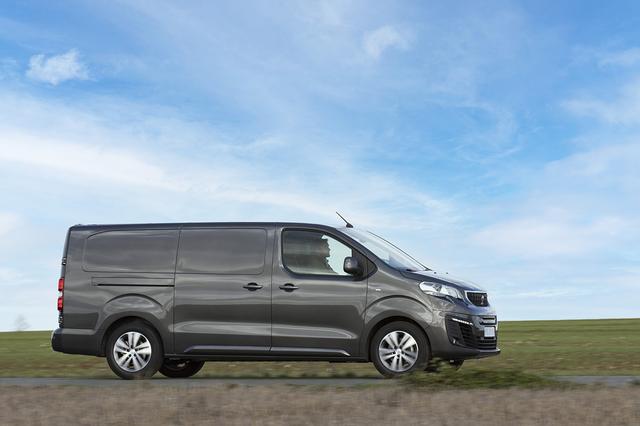Peugeot E-Expert: a versatile electric utility…
The PSA group is launching a 100% electric variant of its medium van. Versatile, efficient, pleasant to drive and inexpensive, this model which refuels at the outlet, deals a serious blow to the competition.
In the field of utilities, even more than elsewhere, manufacturers are joining forces and building partnerships. Objective ? Mutualize the colossal design costs of a new vehicle. The PSA compact LCV is a good example of this type of “economies of scale”.
This vehicle is offered under four different logos. It is called in turn: Citroën Jumpy, Peugeot Expert, Opel Vivaro but also… Toyota Proace. The Japanese manufacturer is indeed an ally of the French group in the field of utility. These vans are almost identical, to the muzzle and to two or three details.
A truly successful zero-emission variant has just been launched. She sets the record straight. Most utilities running on Watts were, until then, simple summarily electrified thermal vans.
This new eco-friendly version was developed from the start for electricity. As a result, the batteries in particular are much better integrated than before. They have their own place under the floor. This makes it possible to lower the center of gravity, to the benefit of road handling. This architecture also makes it possible to keep the loading volume almost intact.
Aboard the Peugeot e-Expert…

For the test, we set our sights on the Peugeot e-Expert. From the outside, it is very difficult to differentiate the electric and thermal variants. Basically, it's white bonnet and white bonnet, except for the exhaust pipe and the fuel flap.
The electric version offers the same choice of bodies as the thermal range. It is available in van, passenger transport, crew cab (with 5 or 6 seats) and floor-cab designed to accommodate special bodywork and in particular tippers. Note that the charging socket takes place on the left front fender. As standard, the van receives a single sliding door. The second option can be motorized for 400 euros.
The e-Jumpy is available in three different lengths: 4.60 m, 4.95 m and 5.30 m and three distinct useful volumes: 4.6 m3, 5.8 m3 or 6.6 m3. Something to adapt to all uses. The Moduwork modular partition option, equipped with a folding passenger seat, is available for 400 euros. It saves 1.16 m in useful length (for a little over 4 m in all).
In terms of payload, the new electric van does, with a maximum of 1150 kg, almost as well as the thermal versions.
Two batteries to choose from
Under the hood, the zero-emission van receives a 100 kW electric motor developing 136 hp, already seen on the Peugeot e-208 and e-2008. Two variants are available with a 50 or 75 kWh battery which offer 230 and 330 km of range respectively. “Sufficient” figures, according to Peugeot.
The lion brand affirms that “80% of utilities travel on average less than 200 km per day”. In any case, these performances mark a clear improvement compared to the competition. The VW e-Crafter and e-Transporter can only count on 115 and 138 km of autonomy. The Mercedes e-Vito and e-Sprinter do barely better with 138 km for the first city and a maximum of 156 km for the other…
High-level comfort on the road
Inside, the dashboard, very similar to internal combustion versions, incorporates a specific instrumentation unit, equipped with an econometer. The gear lever gives way to switches offering 3 driving modes.
Eco mode limits the power to 60 kW (82 hp) and the torque value to 190 Nm, in order to promote autonomy. The Normal mode with respectively 80 kW (110 hp) and 210 Nm, is assigned to daily use. Finally, the Power mode is not intended for competition on the circuit but for heavy loads. In this case, the full power of 100 kW and the full torque (260 Nm) are available.
On the road, comfort is of a high level, thanks in particular to the multiple adjustments of the driver's seat. Without vibration, without gears, with a very low noise level and lively accelerations, the new utility is very pleasant to drive. The maximum speed limited to 130 km/h is sufficient. It will prevent the impatient from losing their points too quickly. The vehicle, however, has nothing lymphatic about it. Thus, it shoots 0 to 100 km/h in 13 seconds and goes from 80 to 120 km/h in 12 seconds. Note that the electricity consumption increases a lot with the speed.
Reasonable rates
The Peugeot e-Expert, like the Citroën e-Jumpy, starts at 36,100 euros with the 50 kWh battery and at 41,100 euros with the 100 kWh battery. In this regard, the Opel Vivaro-e does a little better, with an entry-level price of 33,200 euros. On the equipment side, the 180° overhead reversing camera, equipped with an automatic zoom at the end of the maneuver is a real plus.
The PSA van, which finally has a decent range, is the first versatile electric LCV. He is able to carry out most of the daily movements of a craftsman. He also has the right to circulate in the ZFE (low emission zones)… And therefore allows him to continue working in the city.
How long to recharge |
Peugeot e-Expert: main technical data
|
Source: batirama.com/Nicolas Dembreville









